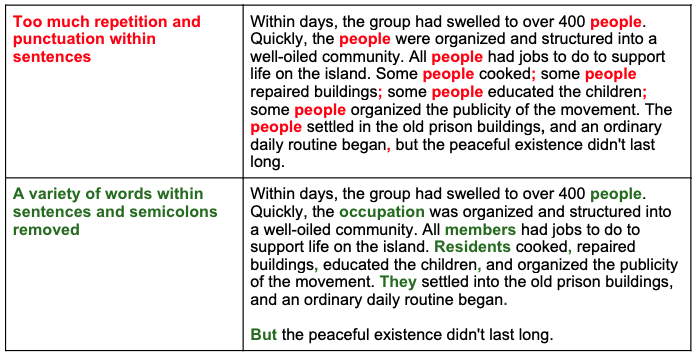In the last few weeks, we have been discussing the most common grammatical, punctuation, and spelling mistakes in the English language. This week, we will discuss 5 ways to improve your writing style (regardless of genre). While these elements of style are not actual errors, it is important to keep a pulse on your own writing style and your propensity to overuse passive voice, descriptive language, prepositional phrases, and tautologies. Varying your language and sentence structure will ensure that you are expressing yourself as clearly as possible and keeping your reader engaged.
1. Active vs. Passive Voice (L.8.3.A)

Most of the time, we speak in the active voice, meaning that the subject of the sentence is doing the action. For example, “I am writing this article right now.” The subject “I” is the person performing the action of writing, so this sentence is written in the active voice. If I rephrased the sentence to say, “The article is being written by me,” then that would be in the passive voice. This sentence downplays the fact that I am writing the article, by making the article the subject of the sentence. As a result, the sentence is longer and more unclear to the reader. This is why active voice should be used MOST of the time.
There are some instances when passive voice is more appropriate:

There are times when we don’t know who the exact performer of the action is, or the performer of the action is not as important as the receiver of the action. In that case, it makes more sense to use the passive voice. Sometimes people will purposefully use the passive voice to put more focus on the receiver of the action than the performer, such as instances in which people want to deflect blame from the doer of the action. This often happens during public scandals. Finally, you are most likely to elect to use the passive voice to make your writing sound more formal, especially to avoid using the first person in academic writing. Be careful, though. Sometimes, in an effort to make our writing sound more formal, we can overuse the passive voice and make our writing sound bulky and unclear. Try to ensure that there is a balance between the active and passive voice in your writing.
2. Overusing Descriptive Words (L.7.3.A)

Adjectives and adverbs have their place in writing. It is important to make sure that you are describing nouns and verbs accurately in sentences to help your writing come to life. However, there are times when descriptive words can be unnecessary and overused. Using too many adjectives to describe nouns, particularly in fiction writing, can become bulky and can slow down the pace of the narrative. You will likely use more descriptive adjectives at the beginning of a narrative than at the end (when you are trying to help your reader visualize the setting and characters). As you get closer to the climax, however, make sure that your narrative is not slowed down by too much description. If you are using two or more commas to separate adjectives in a series, consider removing one or two of the descriptors for the sake of pacing.
Adverbs can also be overused, particularly when writers aren’t using the strongest verbs to describe the action. For example, if you want to describe someone as “really smart,” consider replacing the verb with “intelligent,” or “brilliant,” to remove the need for the adverb. The lesson to be learned here is that more is not necessarily better; sometimes choosing fewer but more accurate vocabulary words will achieve the desired effect.
3. Overusing Prepositions and Prepositional Phrases (L.9-10.1.B)

Similar to overusing descriptive words, it is also common to overuse prepositions and prepositional phrases in writing, in an attempt to describe relationships and action. Instead of using possessive nouns, it can be tempting to use the preposition “of” to describe the possessive relationship between two nouns. Just like overusing passive voice though, it is bulkier and less clear to use the preposition than the possessive. If you are still confused about how to use possessive nouns, please consult our previous articles on grammar and punctuation.
It can also be tempting to use more than one prepositional phrase in a sentence in order to thoroughly describe the location or timing of an action. This can also make our sentences long and unwieldy, however. Similar to listing adjectives, if you find yourself wanting to use two or more prepositional phrases in a sentence, consider using stronger verbs and descriptors instead. This ensures that our sentences do not get too wordy.
4. Wordiness and Tautologies (L.7.3.A)

We know that run-on sentences are bad, but where is the cutoff? The novice writer can fall prey to the notion that longer sentences are better, provided that they are grammatically correct. Not true, however! As we have learned with descriptive language and prepositional phrases, more words and phrases are not necessarily better and can make your writing seem bulky and confusing. Sometimes, simple and direct is best, particularly when making a direct request to a reader.
Writers can also fall prey to using tautologies, which is a fancy term for saying the same thing twice, just in a different way. “First and foremost,” “In my opinion, I think,” and “close proximity” are common tautologies that show redundancy rather than clarity. Basically, overusing passive voice, descriptors, prepositional phrases, and tautologies reveal that more is not necessarily better in writing.
5. Varying Sentence Structure (L.6.3.A)
A way to ensure that you are not inflating sentences with unnecessary redundancy (see what I did there?) is to vary your sentence structure. We know that we can have simple sentences, compound sentences, complex sentences, and compound-complex sentences. It is important to vary your writing patterns to add clarity and interest for the reader.

Having too many short, simple sentences can make your writing sound choppy and boring to the reader. Consider combining sentences to make your writing sound more complex.

In the above example, the word “people” is repeated several times in the unedited paragraph, and semicolons and commas are used too often. In the revised paragraph, the word “people” is only used once, the semicolons are removed, and the final sentence is put into its own paragraph to increase tension and encourage the reader to keep reading. This ensures that we are using a variety of vocabulary words in our writing and we are using punctuation and sentence structure to our advantage.
How Afficient Academy can Improve Your Writing Style
At Afficient Academy, we are proud to offer lessons about narrative, informative, and persuasive writing styles throughout our Afficient English curriculum. Our students don’t just practice a few exercises once; they have to demonstrate proficiency consistently throughout the program. This ensures that students don’t forget these complex concepts over time, as they progress through the Learning, Proficiency, and Afficiency sections of our product. Our program also ensures that students continue to practice skills as they advance in grade levels, so elementary skills won’t be forgotten as students move on to more complex concepts. Take our FREE diagnostic test to find your instructional level in English language arts and get to work analyzing language in writing for optimal style!





